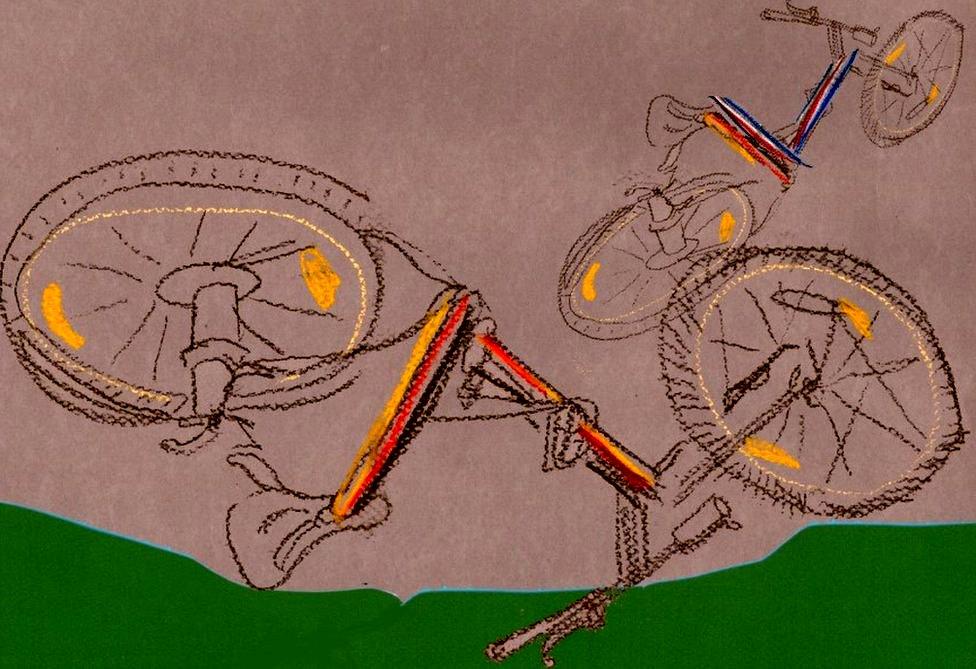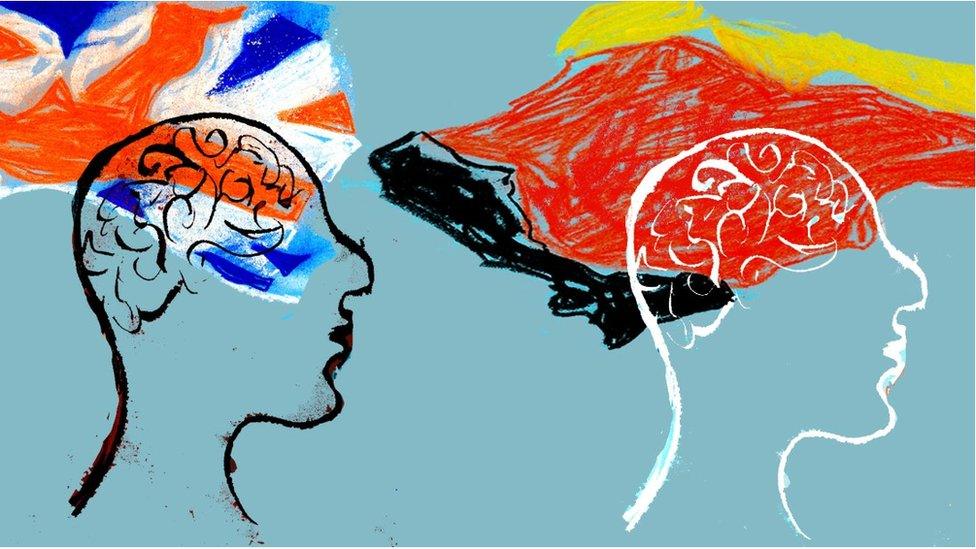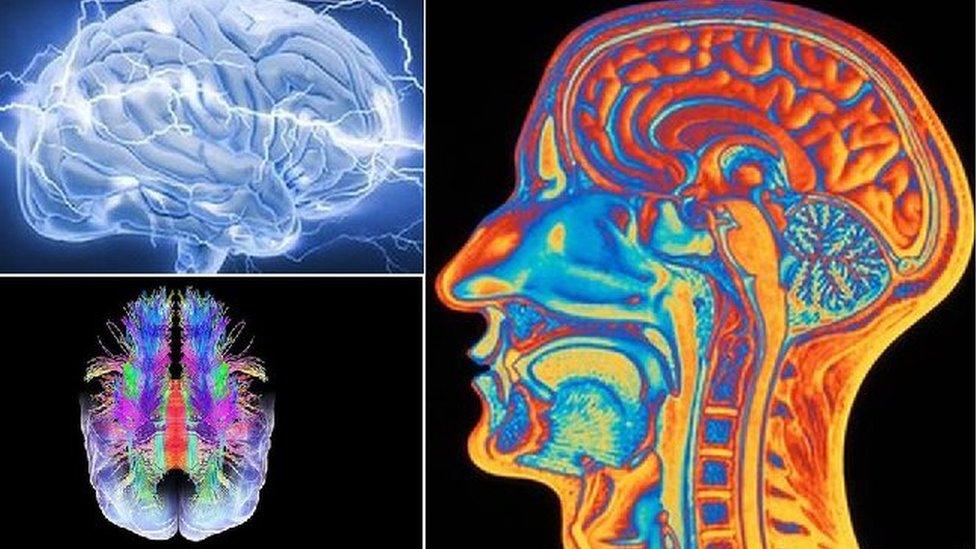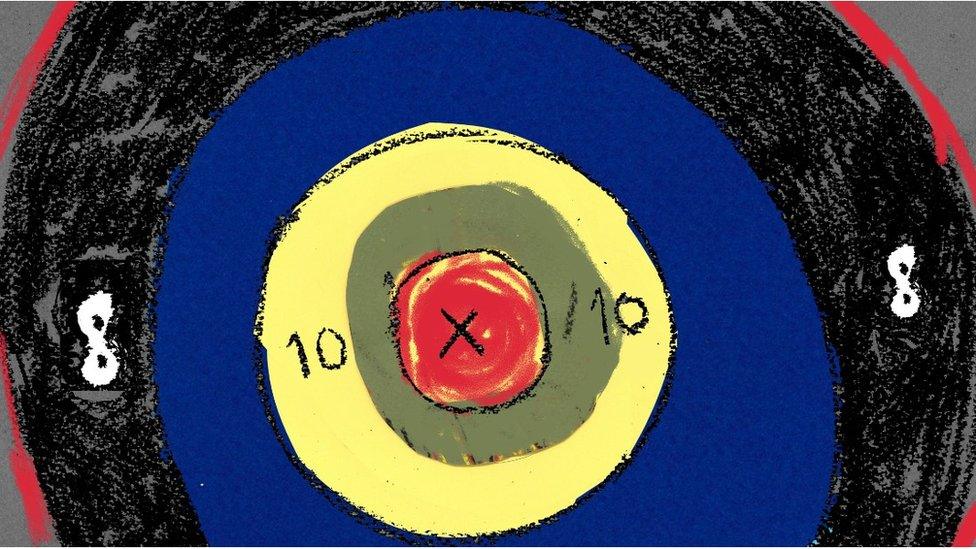I woke up unable to speak English
- Published

Hannah Jenkins speaks English in the morning and German in the afternoon. It's not a routine she chose to adopt - but something her brain requires her to do. It all started with a cycling accident.
Her partner Andrew Wilde was halfway up a mountain in the US state of Montana when he received a baffling text from Hannah.
He understood only two words - "dog" and "hospital" - but knew instinctively something was wrong.
The text was in German, a language Hannah had grown up with, but Andrew didn't really understand. They only ever communicated in English.
Hannah had stayed at home in the UK, running the dog-training business she'd set up in Wokingham, Berkshire, while Andrew had gone to the US to train for an international shooting competition.

He called Hannah's mobile number, but got no response. With growing unease, he started to phone hospitals around Berkshire but couldn't get any information. He knew he needed to get home.
He made his way to the airport, unsure of what would be waiting for him when he returned.
What he didn't expect to find, was a different Hannah to the one he'd kissed goodbye days earlier.
Hannah had been cycling through a park near their home the day before she sent the text to Andrew.
She'd rounded a familiar corner and collided with another cyclist.
She remembers little, but paramedics have since filled her in - the other cyclist saw her lying motionless and bleeding on the ground and called emergency services.
He waited for help to arrive, told them he'd been cycling no faster than 32km/h (20mph), then left, without giving any more information.
An air ambulance was called for Hannah, who had been identified from items in her wallet.
It was touch and go whether she would survive.

Listen to the podcast: The bike crash which made me forget English
A cyclist is left confused after a crash causes her to lose the ability to speak English.
A full transcript is available here. For more Disability News, follow BBC Ouch on Twitter, external and Facebook, external, and subscribe to the weekly podcast.

Hannah eventually came to on a busy ward in the Royal Berkshire Hospital with no idea where she was, what had happened or why, in her mind, no-one spoke English.
"I couldn't understand anything," she says. "I felt as though I'd woken up in a foreign country and I couldn't understand why people weren't speaking to me in a way that I could understand."
Doctors tended to her in this unfamiliar language. Finally she recognised what she thought was "name" and "date of birth" - and recited that to anyone who approached. It seemed like the right thing to do.
The doctors were puzzled as Hannah's documents all pointed to the fact she lived and worked in the UK. They knew she was called Hannah Jenkins, and yet she didn't understand or respond to English.
They contacted her next of kin, her sister Margaret, who asked to speak to Hannah.
As Hannah sat in her hospital bed she chatted away on the phone, relieved that she was finally able to communicate with someone.
This bemused doctors, because previously she had only uttered the odd, indecipherable word.
Hannah had so many questions for Margaret, one of them being why the doctors weren't speaking to her in English.
"They are, Hannah," her sister replied.
The crash, it seemed, had knocked Hannah's knowledge of English clear out of her mind.

But she was left with the German that she had learnt as a child - the language that she defaulted to when speaking to her sister.
"The doctors didn't know I could speak German," Hannah explains. "It wasn't until they spoke to my sister that they realised."
The sisters were brought up in the UK speaking German and English, by polyglot parents. Their Austrian mother spoke four languages and their father, a language teacher from Wales, spoke seven.
"German was my first oral language," says Hannah. "It was a rule we had in my house - that when we speak to my family it's always in German, just to keep the language fresh in our heads.
"I couldn't get my head around the fact that in the hospital they were speaking English. My brain had lost my ability to understand that."
Hannah was experiencing something called secondary language loss, according to consultant neurosurgeon Colin Shieff, who is also trustee of brain injury charity Headway.
"Our brains are very sensitive and anything that has the ability to disturb the computer in any way can potentially impact upon the words coming out," he says.
"There is no algorithm that would follow that a specific injury will invariably result in the loss of German nouns or English grammar, but we do lose those bits."
He says the skills learned in childhood are those most likely to be retained - the ability to say "yes" or "no" or even to repeat a nursery rhyme. He says "something that's been ingrained for ever" - is more likely to remain intact and those skills learned later, are the first to go.

Why did Hannah lose her speech?

Many parts of the brain are involved in speech and language, in particular the frontal and temporal lobes
An injury in these areas will affect speech in some way - from remembering vocabulary, to the construction of fluent speech, and for some people, communication will be permanently affected
Occasionally, someone who was fluent in two languages before an injury may lose one language entirely, but retain the other
Information from the brain injury charity, Headway, external

The physical impact of the crash was minimal - a bruised leg and a sore shoulder - so Hannah was discharged within days.
But via her sister, who acted as her translator, she learnt that her brain injury was significant and would take years, rather than months, to improve.
She went home and waited for Andrew.
"I was listening to the radio a lot," she says. "I don't know how much I understood, but when my partner came that's when I learned how badly the language was affected."
The couple had been together for eight years, but now Hannah couldn't understand Andrew - and his school German only got him so far.
They devised hand signals and their own version of sign language. As time went on, Hannah's written English improved quicker than the speaking.
"When the communication really broke, we did resort to writing stuff down and texting or emailing each other, even though we were in the same room," she says.
"My relationship with Andrew has been affected because you can't not talk to each other just because you're tired or under pressure.
"Having that patience for the situation is always a little bit of a struggle. But I certainly couldn't have done it without him."
Andrew took an 18-month sabbatical from his job to support Hannah. Slowly she regained much of her English language, but it's something that even now, three years on, has not returned completely.
It has now become her second language.
"I'm fine in the mornings, but by the afternoon the fatigue really kicks in and I switch in my mind to thinking in German.
"I'll write little notes to myself in German, and I just sort of almost power down that part of my brain that deals with communication, so that in the evening when my partner's back I can communicate again."

The couple also had to come to terms with the fact that Hannah's personality would be likely to change as a result of the crash. She was told she "might not be the same person post-accident".
"I think that's the hardest part to get your head around," she says. "It's almost like you have to go through a bereavement process to say goodbye to the old you, before you can get to know the new you.
"But there is that level of resentment there to start with. I was fighting that quite a lot and saying, 'No, I'm still me, don't be silly, this is who I always am'."
Hannah has recognised a few "subtle changes" in her personality - she's not as patient as she once was - something that led her to close her business.
"I forgot so much of the theory behind it, my reactions are a lot slower and I don't have the subtlety of language that you need when you have to tell people that this isn't the right dog for them."
She has taken up photography and art, something she studied at university, and has thrown herself into a new sport to improve her focus - shooting.
"Shooting has been described as skilled meditation, and I think that is very true because you have to focus completely on what you're doing. If your brain goes off and ruminates or meanders then your shots do the same.
"To start with I could only do it for about 20 minutes, and now I'm up to about an hour-and-a-half."
The crash on an October afternoon in 2015 altered Hannah's life, language and personality, but it is something to which she has learned to adapt.
"Mentally I have to see that this is me now," she says. "I'm happy in my own skin again. So there's no reason why I can't just run with life as I am now."
Illustrations by Katie Horwich

For more Disability News, follow on Twitter, external and Facebook, external, and subscribe to the weekly podcast.